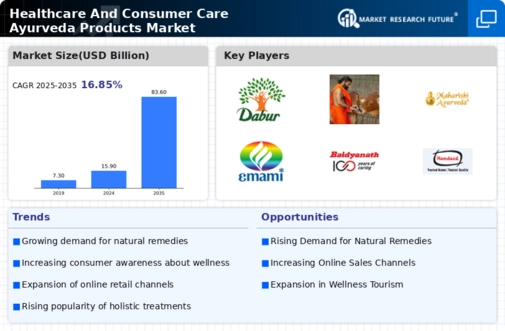Based on the region, the Healthcare And Consumer Care Ayurveda Products Market has been segmented into North America, Europe, Asia-Pacific, South America and Middle East and Africa. Asia-Pacific accounted for the largest market share in 2024. However, North America is projected to grow at the highest CAGR during the forecast period.
The North American market for Ayurveda products is witnessing a robust expansion, fueled by a confluence of dynamic factors. Moreover, rising prevalence of cardiovascular diseases coupled with consumer health consciousness is driving a significant shift toward natural and holistic alternatives, as individuals increasingly prioritize wellness solutions that eschew synthetic ingredients. For instance, According to Centers Disease Control and Prevention. in US Every 33 seconds, one person dies from cardiovascular disease. In 2022, 702,880 persons died of heart disease. That is the equivalent of one out of every five deaths.
This movement is further amplified by a growing emphasis on preventive healthcare, aligning seamlessly with Ayurveda’s foundational principles of balance and longevity. The region's cultural diversity fosters a fertile environment for the acceptance and integration of traditional practices, while the proliferation of e-commerce platforms enhances product accessibility and consumer engagement. Influencer marketing and strategic celebrity endorsements play a pivotal role in amplifying brand visibility and credibility, encouraging consumers to explore the benefits of Ayurveda for stress relief and overall wellness. Furthermore, adoption of e-commerce in US also fuels the expansion of ayurveda products in healthcare and consumer care.
The Europe Healthcare and Consumer Care Ayurveda Products is further segmented into Germany, UK, France, Russia, Italy, Spain, and Rest of Europe. Healthcare drivers are pivotal factors shaping the evolution of the industry, significantly influencing growth and operational dynamics. Technological advancements, including innovations in telehealth and digital health solutions, enhance patient care and streamline operations. The aging population and rising prevalence of chronic diseases intensify the demand for effective management and preventive care. For instance, according to World Health Organization, In the WHO European Region, the population over the age of 60 is rapidly increasing.
In 2021, there were 215 million; by 2030, it is expected to be 247 million, and by 2050, more over 300 million. Moreover, according to European Commission, In 2023, over one-third (35.0%) of EU citizens reported having a chronic, long-term health issue. As consumers become more empowered, there is a growing expectation for personalized care and transparency in healthcare decisions. Additionally, regulatory changes and the shift towards value-based care emphasize quality and patient outcomes, prompting providers to focus on effective treatments.
The healthcare and consumer care Ayurveda products market in the Asia-Pacific region is witnessing robust expansion, driven by a growing consumer preference for natural and holistic health solutions. Increasing health consciousness is prompting consumers to seek Ayurvedic remedies, particularly in the realms of skincare, dietary supplements, and herbal products, which align with preventive care philosophies. The deep-rooted traditions of Ayurveda in countries like India, Sri Lanka, and Nepal are influencing consumer preferences, leading to a resurgence in the popularity of Ayurvedic products both locally and internationally.
The rising merger and acquisition (M&A) activity among the market players, which is driven by rising demand for natural and organic products, industry consolidation, and the need to broaden geographical reach. for instance, in November 2022, Mankind Pharma, an Indian pharmaceutical business, acquired Upakarma Ayurveda Private Limited, which manufactures, develops, and sells Ayurvedic and herbal medicines. This acquisition is intended to broaden Upakarma Ayurveda's product and service offerings by using Mankind Pharma's extensive distribution network.
The healthcare and consumer care Ayurveda products market in South America is being propelled by a range of dynamic drivers that are reshaping consumer preferences and market opportunities. Cultural acceptance and a rich heritage of traditional practices foster an environment conducive to Ayurvedic solutions, as consumers increasingly seek holistic approaches to health. The rising prevalence of chronic diseases fuels demand for preventive care, aligning with Ayurveda’s emphasis on lifestyle management. Additionally, the expansion of e-commerce platforms enhances product accessibility, enabling brands to reach a broader audience effectively.
Global wellness trends and a heightened focus on sustainability further elevate the appeal of natural and ethically sourced Ayurvedic products. As skin diseases are rising in South America consumers are more inclined towards holistic approaches. For instance, according to Pierre Fabre, in 2022, Acne was most prevalent in Latin America (23.9%), East Asia2 (20.2%), Africa (18.5%), and the Middle East (16.1%), with the lowest frequency in Europe (9.7%) and Australia (10.8%). As regulatory frameworks evolve to support traditional medicine, and as educational initiatives enhance consumer understanding, the market is poised for significant growth.
Moreover, the impact of celebrity endorsements and influencer marketing is amplifying brand visibility, positioning Ayurvedic offerings favorably within the competitive health and wellness landscape. Together, these drivers present substantial opportunities for businesses looking to capitalize on the burgeoning demand for Ayurvedic solutions in the region.
The Ayurveda market in the Middle East and Africa is experiencing robust growth driven by several strategic factors. Increasing health consciousness among consumers is prompting a shift towards natural and holistic alternatives, significantly boosting demand for Ayurvedic products. Cultural integration of traditional healing practices enhances consumer acceptance and trust, while the growing focus on preventive healthcare encourages individuals to adopt Ayurvedic solutions for overall wellness. The region's aging population is further fueling interest in Ayurvedic remedies for chronic condition management.
For instance, according to the United Nations World Population Prospects, the number of people aged 60 and up in Sub-Saharan Africa would rise from 50 million in 2020 to 600 million by 2100. This implies a shift in demographic composition, with people over the age of 60 comprising 5% of the population in 2020 and nearly 20% by 2100.
Figure 3: HEALTHCARE AND CONSUMER CARE AYURVEDA PRODUCTS MARKET BY REGION 2024 & 2035 (USD Billion)

Source: Secondary Research, Primary Research, Market Research Future Database, and Analyst Review



















Leave a Comment